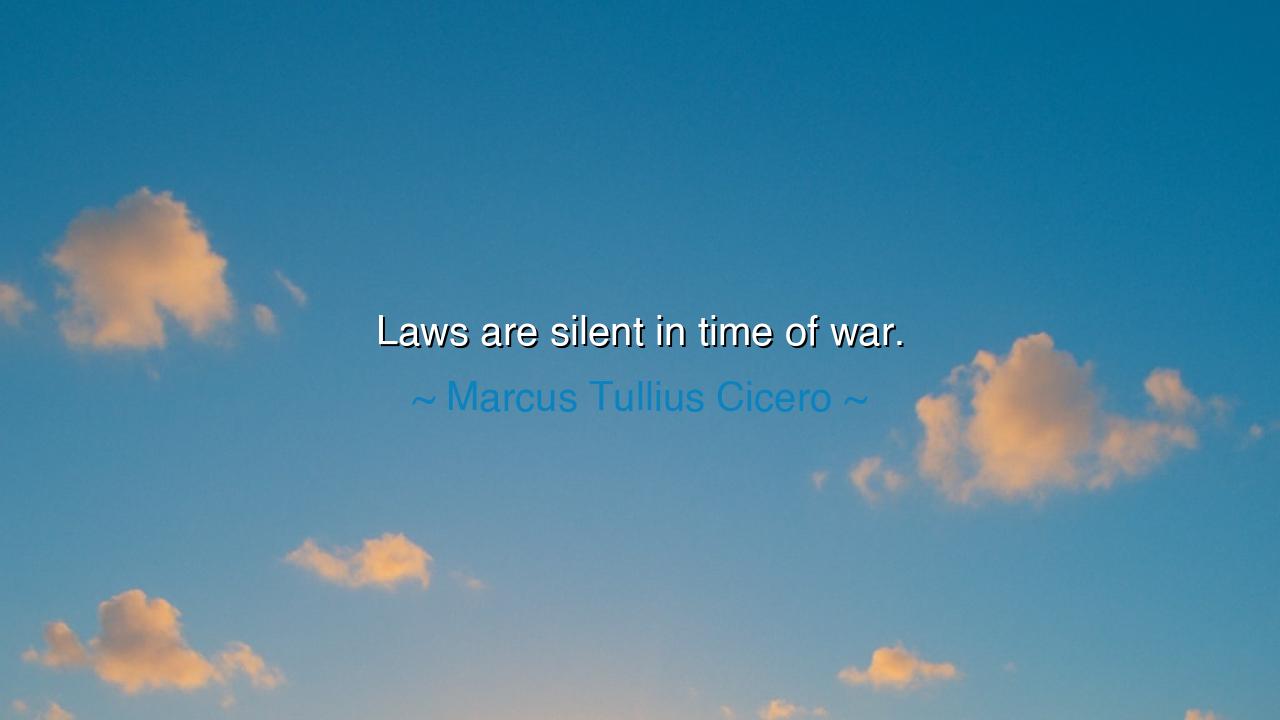
Laws are silent in time of war.






Marcus Tullius Cicero, the Roman orator and philosopher, spoke with a voice that has echoed through centuries: “Laws are silent in time of war.” These words, sharp as the edge of a gladius, rise from the turmoil of the late Roman Republic, when the state trembled under conspiracies, invasions, and civil strife. Cicero, defender of the Senate and of Roman tradition, knew the fragility of order when the trumpets of war sounded. His words are not merely a description of war’s brutality, but a solemn recognition that the rule of law—the sacred thread binding a people—often falters when the sword is drawn.
The meaning of this saying lies in the tension between justice and necessity. In times of peace, nations cloak themselves in laws, in rights, in procedures that preserve fairness and order. But when war erupts, when survival itself is threatened, these laws fall silent, for men turn not to parchment but to steel. Cicero understood that the emergencies of war force rulers to act swiftly, without the restraint of legal debate. In such moments, life and death, victory and ruin, hang in the balance, and the delicate voice of law is drowned by the thunder of battle.
The origin of Cicero’s words comes from his defense of Titus Annius Milo, who had been charged with murdering his rival, Publius Clodius Pulcher. In his speech, Cicero argued that Milo’s act was justified as self-defense in a time of chaos, when ordinary law could not protect him. From this courtroom moment grew the larger maxim: in the heat of danger, laws are silent, for the instinct of survival speaks louder. What began as rhetoric in a trial became a principle often invoked in the centuries that followed.
History itself bears witness to the truth of this saying. During World War II, democratic nations suspended many of their own liberties—censorship was imposed, curfews enacted, citizens detained, industries commandeered—all in the name of survival. In Rome, too, the Senate would declare a “senatus consultum ultimum,” a final decree that gave consuls extraordinary power in times of emergency, effectively silencing the ordinary protections of law. Each case shows us the peril Cicero warned of: when war rages, the law withdraws, and necessity commands.
And yet, Cicero’s words must not be taken only as cold acceptance. They are also a warning. For though laws may fall silent in war, when peace returns, the people must be vigilant to restore them. If silence continues after the swords are sheathed, then freedom itself is lost. Rome’s own fall was hastened because emergency powers, once granted, were never fully withdrawn. Dictators rose, civil liberties perished, and the Republic gave way to empire. Thus Cicero’s phrase is both observation and prophecy: the silence of law in war can become the death of law forever.
The lesson for us is this: guard the law as you would guard your own life, for it is the shield of civilization. In times of peace, cherish it. In times of war, mourn its silence but demand its return. Do not allow necessity to become an excuse for tyranny, nor crisis to become the permanent order. For war may require silence, but justice requires a voice, and without justice no nation can endure.
Practical wisdom flows from this truth. In your own life, know that crisis may force you to act quickly, even harshly, but do not forget to return to fairness when the storm passes. On a larger scale, demand of your leaders not only strength in war, but humility in peace—the willingness to lay down extraordinary power and return to the rule of law. In this balance lies the survival of freedom.
Thus Cicero’s words endure: “Laws are silent in time of war.” They remind us that war tests not only armies but civilizations themselves. And though the sword may at times drown out the law, the wise know that it must not remain so. For the greatness of a people is not in their victories on the battlefield alone, but in their ability to restore justice when the trumpets of war have faded into silence.






AAdministratorAdministrator
Welcome, honored guests. Please leave a comment, we will respond soon